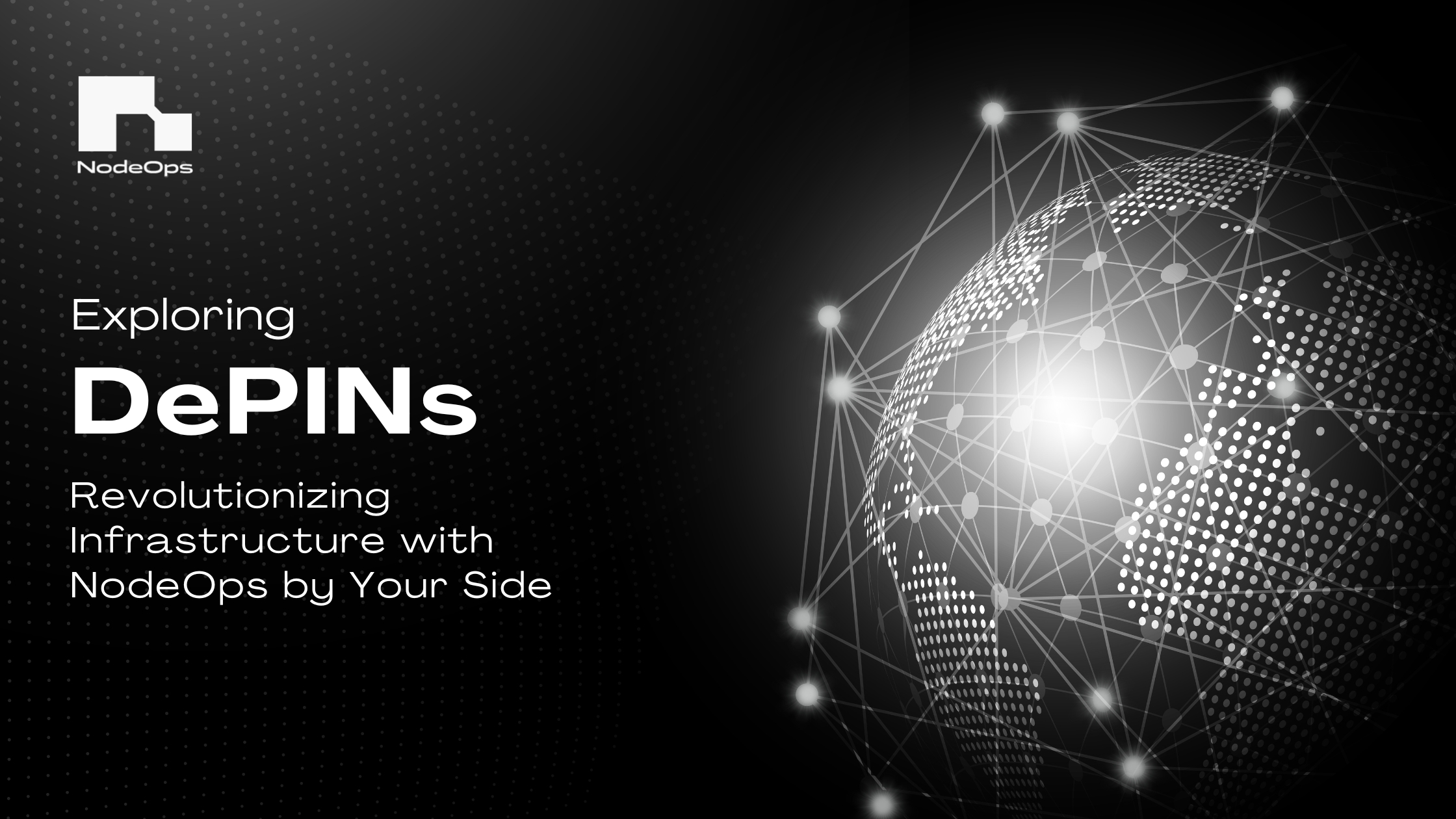Exploring DePINs: Revolutionizing Infrastructure with NodeOps by Your Side
 NodeOps
NodeOps
Have you ever wondered if there's a way to build essential infrastructure like cloud storage, wireless networks, or even energy grids without relying on big corporations? Well, there's DePINs, or Decentralized Physical Infrastructure Networks.
DePINs are revolutionizing the internet infrastructure by empowering users and leveraging public blockchains. For instance, users can contribute resources - electricity and internet bandwidth - and receive micropayments. It sounds innovative, because it is.
After all, it's a fresh approach to thinking about and building infrastructure, flipping the traditional top-down approach on its head. Let's talk about DePIN, why it's generating so much buzz, its benefits, and how NodeOps can help you as a partner in performing node operations with just one click.
What is DePIN?
Technically speaking, DePIN (Decentralized Physical Infrastructure Network) is a blockchain-based technology that enables the creation and management of physical infrastructure networks in a decentralized manner. This approach allows users to contribute physical resources, such as sensors, data storage, and wireless connectivity, to the public in exchange for DePIN tokens. These tokens can be used to pay for data transfer, reward hotspot operators, and participate in network governance.
DePINs utilize nodes to build and maintain physical infrastructure networks. These nodes are incentivized to participate through a token-based system, which rewards them for their contributions.
Still confused? Let's clarify this by understanding the real-time use case of Helium.
Helium, a decentralized wireless network, is a standout example of a DePIN project. Users can purchase a Helium-compatible gateway, similar to a traditional WiFi hotspot, and install it at their homes or businesses. These hotspots provide wireless coverage to the surrounding community, and those who host them are rewarded with tokens that can be cashed out. This approach not only decentralizes network coverage but also incentivizes local participation.
The traditional challenge of building and maintaining IoT networks has been the high cost, leading to the failure of many centralized providers. Helium overcomes this by distributing the costs and responsibilities across a broad community, enabling a more sustainable and scalable network.
Helium has rapidly expanded since its launch in 2019, with over 392,000 hotspots worldwide. This community-driven model allows individuals and small businesses to take control and improve local wireless coverage rather than relying solely on large telecommunications companies.
Categories of DePIN
Cloud Storage Networks
DePIN is changing the game by decentralizing storage and server networks to make data storage more resilient and secure. Unlike traditional centralized services, which can fail if one point goes down, DePIN spreads data across multiple storage nodes. This decentralized approach means there’s no single point of failure, making the whole system much more potent.
DePIN provides a common storage service covering everything from file storage and Content Delivery Networks (CDNs) to relational databases and VPN networks. This increases security and ensures your data is always accessible, no matter what happens.
Energy Networks
DePINs for energy networks revolutionize energy trading and sharing, allowing direct selling or trading of surplus energy within local communities while promoting a community-centric energy distribution approach. Such a network consolidates distributed energy sources, enhancing grid resilience and efficiency.
Wireless Networks
DePIN transforms wireless networks of course, such as 5G and WiFi, by establishing a decentralized hotspot network like the Helium project we just mentioned. This approach democratizes internet access and addresses connectivity gaps often overlooked by traditional ISPs (Internet Service Providers) in remote or rural areas. Furthermore, DePIN supports advanced technologies like 5G and LoRaWAN for the Internet of Things.
Sensor Networks
DePIN's decentralized sensor networks collect accurate, secure, and transparent data from diverse environments, ensuring the integrity and accessibility of sensor data. Through interconnected devices equipped with sensors, real-time data collection is facilitated, improving both mapping capabilities and data integrity.
Benefits of DePIN
Faster Infrastructure Development
Claims suggest infrastructure can be built 10 to 100 times faster than traditional methods.
Local Market Adaptation
DePIN allows for better alignment with hyper-local market needs.
Cost Efficiency
Potential for significant cost reductions compared to centralized approaches.
Scalability and Neutrality
Networks can scale across jurisdictions without the need for permission, maintaining a credibly neutral and collectively owned structure
Micro-Payments and DeFi Integration
Blockchain technology supports frictionless micro-payments and seamless integration with decentralized finance (DeFi) applications.
The DePIN Flywheel
Supply Side Growth: The initial phase involves retail participants providing resources and receiving token incentives.
User Attraction: As the network infrastructure develops, it attracts users who pay for services, generating revenue.
Virtuous Cycle: Increased demand boosts supply-side participation, further incentivized by the rising value of tokens as network usage grows.
Challenges and Viability
The DePIN space does have considerable promise, but also plenty of hurdles:
Incentive Model Dilution: Token incentive models can suffer from dilution issues, which can reduce their attractiveness in practice. The number of tokens issued and their value can be difficult to balance, leading to a dilution of the tokens' value over time.
Long Development Time: Building and generating demand for DePIN infrastructure requires prolonged timelines, which contrasts with the faster pace of consumer-facing applications.
Legacy Competition: DePIN initiatives face significant competition from established Web 2.0 giants like Amazon, Microsoft, and Google, which can be challenging to disrupt. This competition demands substantial effort and expertise to overcome
NodeOps: Your go-to partner for node operations
Now, let's explore why NodeOps stands out as your go-to partner for node operations in one-click deployment.
Driving Developer Traction: At NodeOps, we aim to attract developers by simplifying the development process and offering incentives to join Web3 protocols.
Infrastructure Setup Challenges: We eliminate the daunting task of setting up infrastructure by providing a containerized setup, allowing developers to focus solely on their applications.
Simplifying Node Operations: NodeOps streamlines operations for Node Operators, leveraging AI to simplify processes and allowing them to focus on higher-level tasks.
Aggregator Platform for Developers: Our platform serves as a central hub for developers, offering a wide range of resources conveniently in one place, from RPCs to Q&A and GitHub monitoring.
Enhanced Security Measures: We prioritize security by providing monitoring tools that alert developers to potential vulnerabilities, ensuring the integrity of their code.
Simplicity: NodeOps values simplicity, offering developers an easy-to-use platform for building applications without unnecessary complexities.
We also offer cutting-edge features such as Node-as-a-Service for effortless node management, an AI-powered playground for quick code experimentation, and Containerized Infrastructure Setup to simplify development. With Monitoring Tools for Codebases, Preset Templates, and On-Chain Incentivization, NodeOps ensures security, efficiency, and rewards for developers.
NodeOps is the only node operator supporting almost all of the recent node infrastructures that raised more than 125 million via their Node Sales, including XAI, HyChain, Avail, Zora, and more- with over 17,000 nodes powered by us in the last quarter alone. We currently support over 20 chains and deliver single-stop node deployment solutions for node infrastructures and relevant communities.
Join NodeOps today and try out one-click node deployment across our supported protocols. Further, for protocol updates, follow NodeOps on X!
Subscribe to my newsletter
Read articles from NodeOps directly inside your inbox. Subscribe to the newsletter, and don't miss out.
Written by

